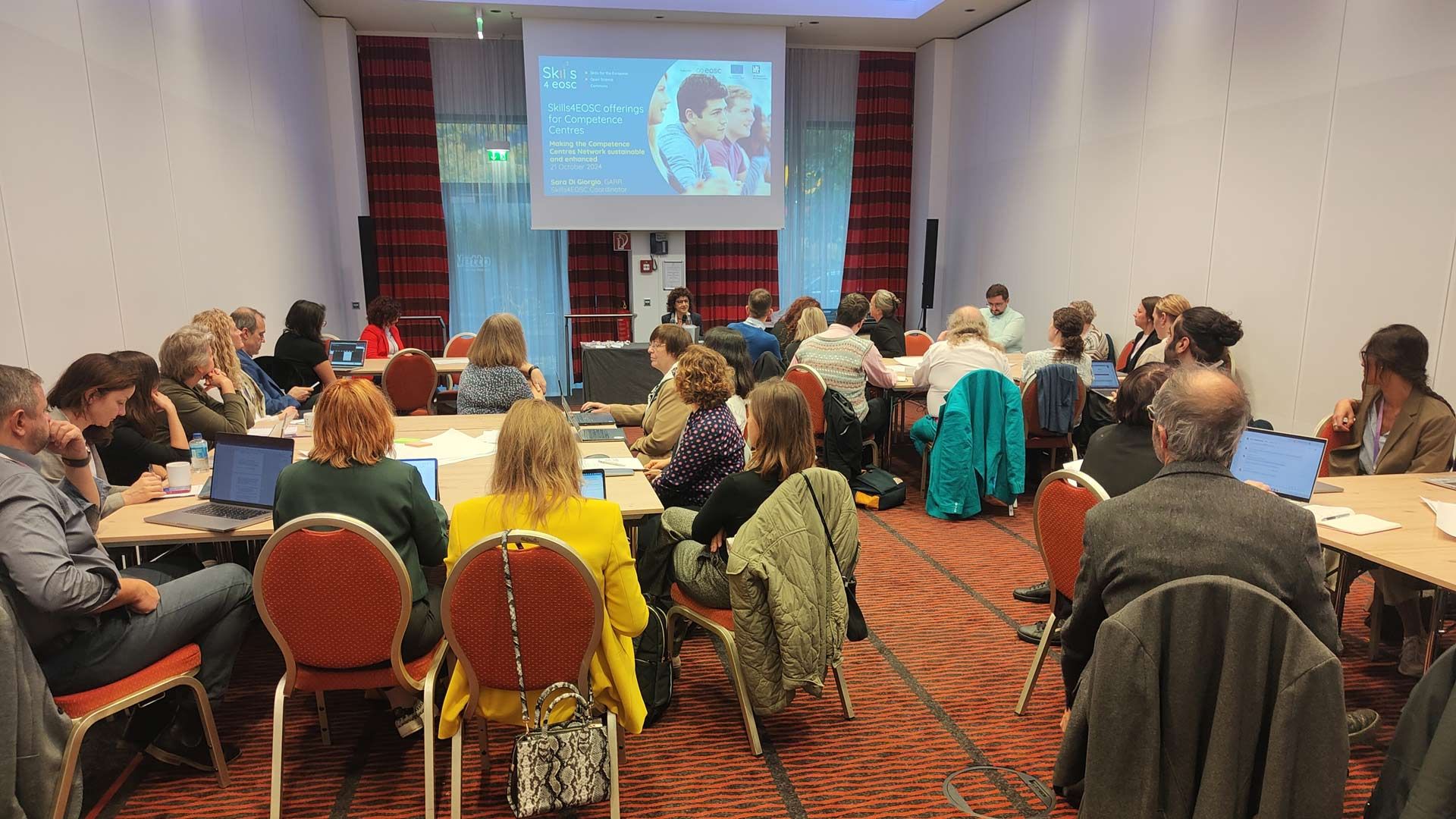
Workshop Report: Making the Competence Centres Network Sustainable and Enhanced
- Date: October 21, 2024
- Location: Berlin (in-person event, held at the EOSC Symposium venue)
On October 21, 2024, the Skills4EOSC project hosted a strategic workshop in Berlin, bringing together 43 representatives from Competence Centres, project partners, and guests from other EOSC-related initiatives. The workshop aimed to refine the role of Competence Centres (CCs) within the European Open Science Cloud (EOSC), focusing on their sustainability, collaboration strategies, and alignment with the broader European Open Science ecosystem.
Vision for Competence Centres in the EOSC Ecosystem
The workshop reinforced a shared vision for Competence Centres as critical components of EOSC:
- Integration with EOSC Nodes: Competence Centres and EOSC Nodes should work complementarily, with CCs embedded into National Nodes to enhance the coherence of Open Science processes. In some cases, CCs may evolve into EOSC Nodes, supporting coordinated skill-building efforts across Europe.
- Facilitators and Knowledge Brokers: CCs are envisioned as active enablers of collaboration, fostering cross-border synergies and supporting horizontal coordination within the EOSC Federation. This role emphasises creating standardised, harmonised training and skills development approaches while ensuring accessibility across diverse European research domains.
- Respect for diversity and flexibility: Given the fragmented and multilingual nature of the European research landscape, the Competence Centre Network must maintain a flexible structure that promotes unity while respecting national identities, legal frameworks, and local needs.
Workshop Sessions
The workshop was divided into two sessions, each addressing key areas of the Competence Centre Network's development.
Session 1: Pan-European Dimensions of the Network
This session focused on the broader role of Competence Centres within the EOSC ecosystem, tackling issues such as harmonisation across diverse national frameworks and engaging with other initiatives. Discussions were organised around three breakout topics:
- Implementing the Minimum Viable Skillsets (MVS) into the Competence Centre Network and Country Nodes (led by Kevin Ashley): Participants discussed how the MVS can be a useful tool to help CCs build awareness amongst institutional leaders. They reflected that it was necessary to map skills to roles in more than one way, varying by the size of the institution. They also noted that other stakeholders would likely have skills missing from the CC itself, and the MVS was useful to identify this.
- Competence Centre vs. EOSC Node (chaired by Emma Lazzeri): Participants discussed how CCs can support skills coordination and training while complementing the role of EOSC Nodes. They also explored the potential for CCs to serve as reference points for national and European Open Science initiatives, ensuring standardised approaches to training across all domains.
- Skills4EOSC Competence Centre Network in the European Landscape (facilitated by Clara Lines and Sara Di Giorgio): Discussions highlighted the need for flexibility and inclusivity in navigating the complex European Open Science landscape. Priorities included preparing handover materials for future initiatives, addressing language barriers in resource sharing, and enhancing the visibility of project outputs.
Session 2: Competence Centre perspectives
This session examined sustainability, governance, and opportunities for mutual support within the network. Discussions were organised around two key themes:
- Sustainability and Governance of the Network (chaired by Raimundas Tuminauskas): Participants emphasised the importance of a lightweight, bottom-up governance structure that ensures member-driven decision-making. Sustainability strategies included in-kind contributions, rotating “Presidencies” for governance leadership, and potential support from larger organisations like the EOSC Association.
- Integrating the Data Stewardship Curriculum into Competence Centre Services (led by Kevin Ashley): Participants noted likely variations between countries for how tasks like this were to be approached which would need to be reflected in how CCs approached their work. They also felt that CCs should be able to learn from each other and that it was important to facilitate this.
- Perspectives from individual Competence Centres (facilitated by Clara Lines): Participants discussed practical ways for CCs to support each other, such as sharing expertise, establishing thematic working groups, and exchanging best practices. The Skills4EOSC project was seen as instrumental in fostering these connections, particularly in helping countries establish or refine their Competence Centre structures.
Key takeaways and next steps
The workshop demonstrated the critical role of Competence Centres in advancing Open Science and aligning with the EOSC Federation. Key next steps include:
- Expanding the Skills4EOSC network to include all EU member states.
- Finalising handover materials to ensure continuity beyond the current project.
- Supporting the establishment of new Competence Centres through cross-country collaboration and thematic discussions.
The workshop agenda and additional details are available on the Skills4EOSC website.






 Telegram
Telegram